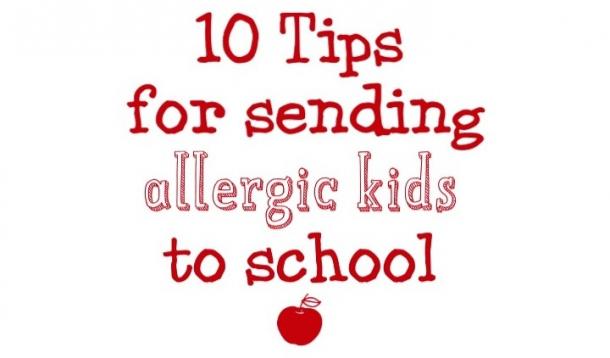
I have a secret: I am majorly freaking out about my son heading off to junior kindergarten this September. He will be one of the very youngest in his class, not turning four until December, and he also has severe allergies. As if it wasn't hard enough sending our little ones off to school! The summer countdown feels that much more ominous this year because of the anxiety I'm feeling about sending my allergic child to school.
To cope, I'm arming myself with preparation to alleviate my worries, and I thought I'd share my top ten tips for sending allergic kids off to school:
1. Find out what your school's policy is for allergy management
Most schools ban nuts these days, so I'm thankful for that. But what if your child has a severe allergy to something else? You'll need to be aware of the policies for each classroom and school. Some rules are managed by the board, some dictated by each school, so make sure you ask. Being your child's advocate is key.
2. Speak to the teacher
Don't rely on the forms sent into the office. Request a personal meeting with your child's teacher before school starts to express any concerns you have. You'll feel much better for touching base and having that personal connection. And maintain that line of communication. Do they prefer phone calls? Emails? Stay on top of the relationship with the teacher to manage your child's care.
3. Have prescriptions from your doctor
Most schools require a note or prescription from your doctor to keep any medications on hand for your child. Whether it's an EpiPen or liquid allergy med, you'll have to have official approval to have them administer it to your child, so make sure you've got all the documents before the first day of school.
4. Prepare your child
By the time kids start school, they should be well aware of their allergies, and the potential repercussions of contact. Even at three years old, my son knows he absolutely cannot eat anything without permission, and knows he must avoid all nuts. Explain to your child that if they feel at all "funny," they should speak to a teacher immediately. Teach them about their reactions: hives, a swollen tongue, itching, anything out of the ordinary. Give them the power to protect themselves. Some schools may require your child to carry their own EpiPen, some may keep it in the office, so be sure your child is aware of the policies, too.
5. Inform the school staff
Everyone from the office staff, teachers and administration should be aware of kids' allergies, reactions and treatment requirements. There's no time in emergencies to go flipping through files for information so be sure they all know what to do for your child in case of contact. My daughter has huge reactions to mosquito bites, but they're not life-threatening, so it's important the school understand that. My son could die from nut ingestion, so that's obviously even more important. Be honest and clear in your communications so that your child is sure to get the best treatment and protection.
6. Inform the bus driver
If your child is in the care of any other adults before or after school, or during lunch times, these people need to be aware of allergies, too. They also need to know what to do in case of exposure, so be sure to make appropriate appointments to speak with them all before school starts. That first week is chaos for everyone, so be prepared early.
7. Ask your school to educate other families
Sometimes allergies are life-threatening, and sometimes they're not, so be honest about your child's reactions and how you need others to manage the allergies. Having the school restrict foods can be helpful, but in the case of some restrictions, it can unfortunately cause resentment from other families. Be clear about whether your child will react: is it from the scent of an allergen? From ingestion? From skin contact? Knowing the details will help other families understand and likely make them more willing to help you and your child.
8. Be the voice of education!
Volunteer your time to teach the school about allergies. Educating those who don't have firsthand experience with allergies is the key to making our environments safer for everyone. Before we had a child with food allergies, we really had no idea just how much variance there could be in reactions. Now, if our son reacts with hives, we barely bat an eye, but when the swelling starts, we move into high gear. Teaching others about this helps them feel more empathy towards our situation, builds respect, and ultimately helps us all. There's nothing as bitter as the parent of a picky child who can't send peanut butter to school, I know. But over time, I think other parents will understand and feel better about some minor accommodations in their kids' lunches.
9. Know where your child will be eating if foods are allergens
Do they eat snacks outside? Do they only eat in their classroom? Is lunch in a communal room? Who supervises them? You have to be aware of all the places your child could come in contact with allergens in order to protect them. Be sure appropriate signage is posted about allergies on classroom doors, etc. If there are school trips planned, be absolutely certain to find out the potential exposures there, too.
10. Ask to be informed when there are temporary or substitute teachers
Often, substitutes are given little notice that they're on duty, so there is likely very little opportunity for them to be briefed on the individuals in their classes. Request that admin staff notify you of any teacher changes so you're able to go over your child's plan with them personally, be it via phone or in person.
Do you have any other tips for readers sending their allergic kids off to school?